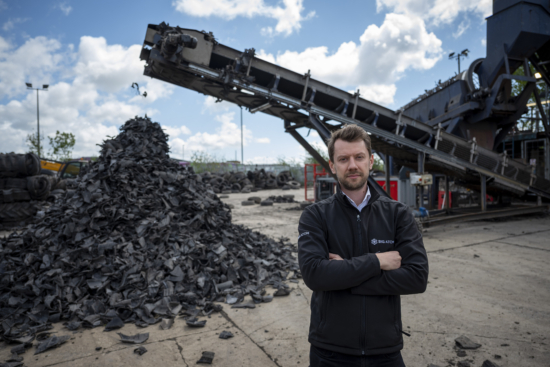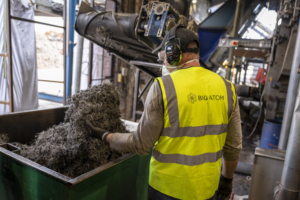Big Atom recycles 1 millionth tyre
 Big Aton’s founder Alex Gulisty is pledging to create a process where polymer waste is regenerated into fully sustainable products, with the same quality as from fossil derived materials (Photo: Big Atom)
Big Aton’s founder Alex Gulisty is pledging to create a process where polymer waste is regenerated into fully sustainable products, with the same quality as from fossil derived materials (Photo: Big Atom)
Big Atom, which operates from Ellesmere Port in the northwest of England, is celebrating the successful processing of its one millionth tyre in three years. Not only is one million a significant sized number, according to the company it represents the first step towards a fully sustainable operation.
Company founder Alexander Guslisty views Big Atom’s milestone as the tip of the iceberg, with the site licenced to process 2,500,000 tyres a year after new machinery was invested to enable higher production levels. At the same time, Big Atom’s workforce has increased to 33 and a recent investment in upgraded machinery has allowed the company to produce rubber crumb in three size variants; 0-2mm, 2-6mm and 20mm.
The process works something like this: Tyres are collected from garages across the North West and North Wales. Then they are shredded and fed to a granulation line where the rubber is down-sized and steel separated.
Approximately 50 per cent of the recovered product is rubber for equestrian arenas and the construction industry. 20 per cent is recovered steel and the rest is of the rubber is further processed to go into surfacing in places like school playgrounds.
“We have achieved a lot and the 1,000,000th tyre is a nice milestone, but we see this as the start and there’s still a lot of work to be done. Road construction is an area of potential growth and trials have taken place involving Highways England using rubber in road construction. This has been shown to reduce energy lost to sound and actually push vehicles along, making cars more energy efficient,” Alexander Guslisty.
As a result of recent expansion, Big Atom is said to be the North West’s second largest tyre recycling plant, accounting for 12 per cent of the region’s market share. But the ultimate aim is “to bring an end to waste entirely by creating a circular economy for polymer materials”.
Plans are already in place to build a patented chemical reactor and testing laboratory to create an even more sustainable regeneration process for polymers, which will be regenerated into new raw materials, such as oil, gas and carbon black.
Approximately 50 per cent of the recovered product is rubber for equestrian arenas and the construction industry. 20 per cent is recovered steel and the rest is of the rubber is further processed to go into surfacing in places like school playgrounds. (Photo: Big Atom)
“The best solutions in the world are always the simplest. We are here because we can make the recycling process so much simpler. We care passionately about the environment, but we also love solving problems and removing convoluted processes. There is a problem with waste travelling thousands of miles on ships which we don’t have control over. We believe that we can solve this problem through our processes,” Guslisty added.
The term ‘circular economy’ is one that is regularly referenced by Gulisty, who is pledging to create a process where polymer waste is regenerated into fully sustainable products, with the same quality as from fossil derived materials.
“If polymers come from crude, then they can be turned back to crude again at a later stage. In fact, this should be happening now,” Guslisty explained highlighting that “0nly 14 per cent of consumer products are recycled at the end of their use, precisely because recycling methods are not fit for purpose” and continuing:
“We’re realistic about the world we’re living in. We’re not environmental purists who shout about the need to be greener, but we are aware of the huge inefficiencies in our recycling processes and we’re working to do something about this. Cars can go electric but we’ll still need a sustainable solution for tyre waste. Clothing is not single use and it’s often made from plastics. We need to recycle those items too.




Comments